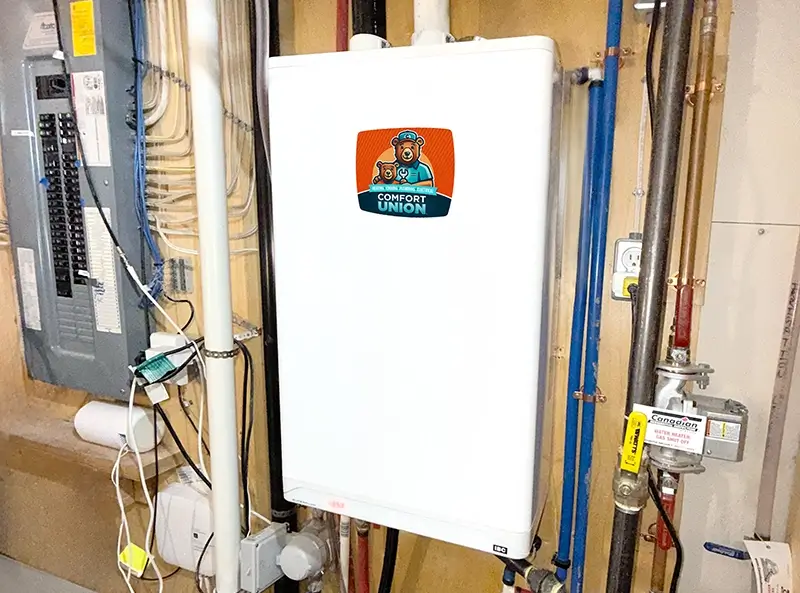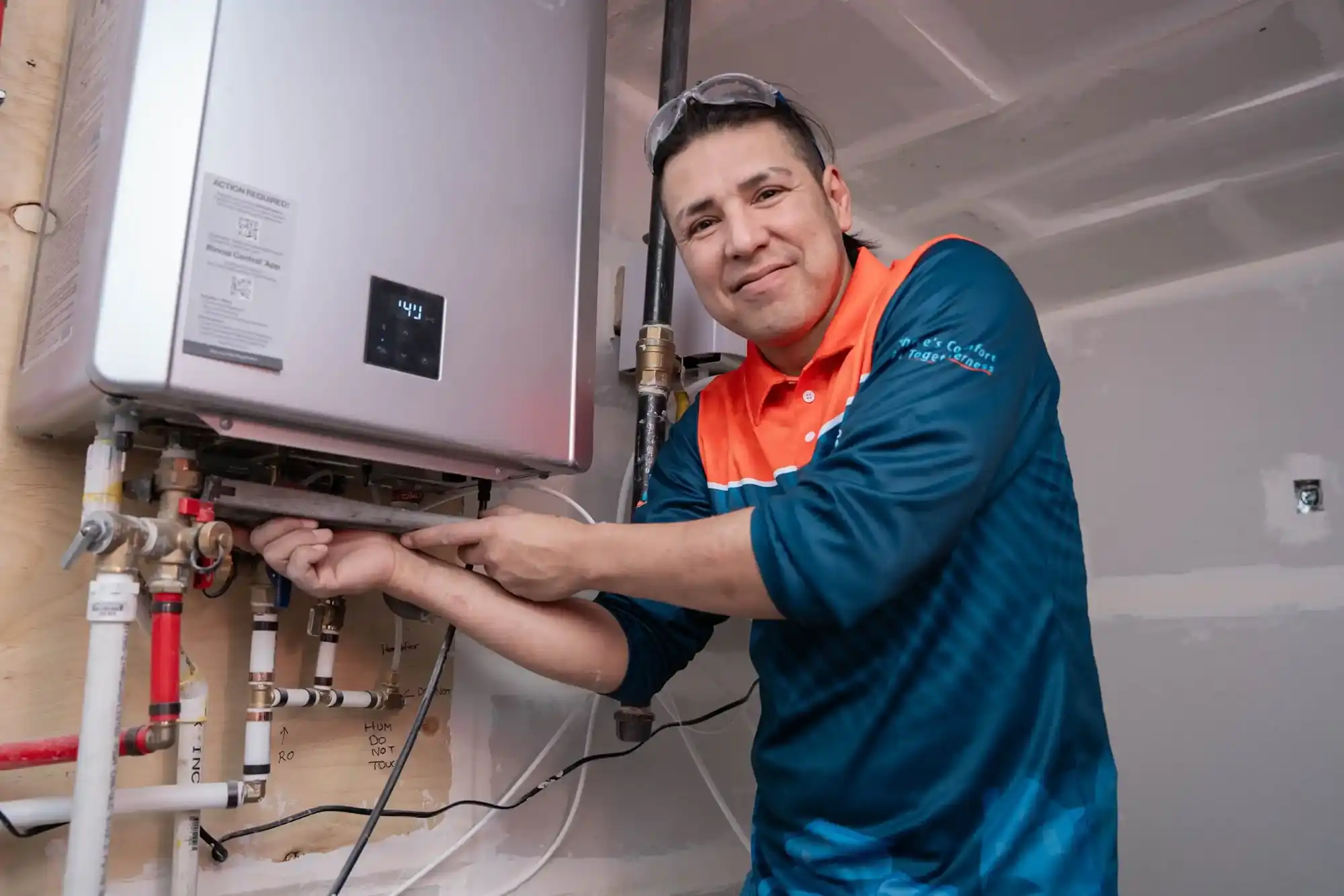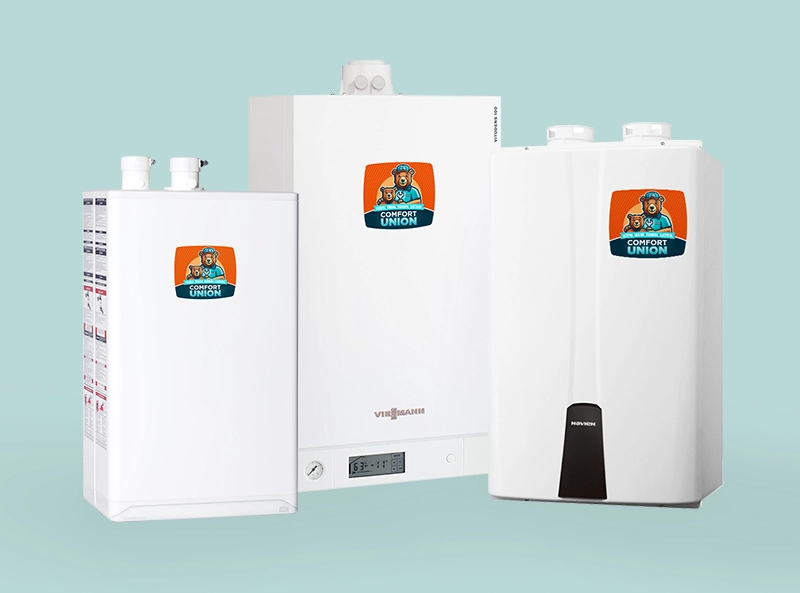When it comes to heating a home in Calgary, one size does not fit all. With deep freezes, fluctuating temperatures, and diverse home designs, selecting the right boiler size is critical. The wrong size can lead to cold spots, high energy bills, or a system that wears out prematurely.
This Calgary-specific boiler sizing guide explains how sizing works, the key factors to consider, and how to make sure your next boiler is the perfect fit for your home and comfort needs.
Need a New Boiler?
With Flexible Financing Options

Why Boiler Size Matters in Calgary
Living in Calgary means we get more than our fair share of -30°C days. That kind of cold puts serious pressure on your heating system. If your boiler isn’t sized properly, it can struggle to keep up or waste a ton of energy trying. Right-sizing your boiler helps you heat your home evenly, lower your monthly gas bill, and extend the life of your equipment.
Undersized boilers struggle in extreme cold
When a boiler is too small, it runs constantly, trying (and often failing) to meet your home’s heating demand. This leads to cold rooms, slow heat-up times, and frustrated families huddled under blankets. These are some of the most common problems in boilers that homeowners encounter.
Oversized boilers waste fuel and short cycle
A boiler that’s too large may sound like a safe bet, but it actually cycles on and off too often, known as “short cycling.” This wears down internal parts, drives up maintenance costs in boiler repairs, and wastes energy.
Right size = lower bills
When your boiler is correctly sized for your home’s heat load, it runs efficiently and evenly. That means better comfort, less wear and tear, and noticeable savings on your energy bills, especially during long Calgary winters.
How Are Boilers Sized?
Boiler sizing is based on how much heat your home needs on the coldest expected day. It’s not just about square footage; it’s about heat loss, insulation, and usage habits.
What BTU means for heating output
BTU stands for British Thermal Unit, and in simple terms, it measures how much heat your boiler produces. The higher the BTU, the more powerful the unit. Most Calgary homes fall somewhere between 50,000 and 150,000 BTUs, depending on size and efficiency. This is true regardless of what boiler brand you have installed.
Heat load vs square footage: what really matters
Two homes with the same square footage can require vastly different boiler sizes. A newer, well-insulated home will need less heating power than a 1970s bungalow with original windows and drafts. That’s why square footage alone can’t determine boiler size.
Online Calculators
Online BTU calculators offer rough estimates, but they can’t factor in things like ceiling height, number of exterior walls, window quality, or floorplan complexity. For accurate sizing, a professional heat load assessment is the gold standard.

What Factors Affect the Right Boiler Size in Calgary?
Every Calgary home is a little different, and so is its heating demand. These key factors influence what size boiler you’ll need, so be sure to note them before buying a boiler:
Outdoor design temperature and climate zone
Calgary sits in a colder climate zone than most of Canada. Heating systems here need to be sized for peak demand during extreme cold snaps, sometimes dipping below -30°C.
Home insulation, age, and window quality
Older homes with poor insulation lose heat faster and require more BTUs. Newer builds with spray foam insulation and triple-pane windows often need smaller systems to do the same job.
Radiant floor vs baseboard vs forced air
The type of heat distribution system you use also affects the boiler size. Radiant in-floor heat requires lower temperatures but often needs longer runtimes, while baseboard radiators or air handlers may have higher peak loads.
Number of zones, bathrooms, and water usage
In a combi boiler setup (for heat and hot water), the number of bathrooms and simultaneous water demands play a huge role. More zones also mean more flow and capacity needs.
When to Call a Pro for Boiler Sizing in Calgary
It’s tempting to guess or Google your boiler size, but the stakes are high if you get it wrong. Calgary homes face unique climate challenges that only local pros with boiler installation experience fully understand.
Online calculators don’t see your vaulted ceilings, basement suites, or 1978 aluminum-frame windows. Real-world sizing needs real-world inspection. A proper boiler consultation includes measuring insulation levels, room-by-room heat loss, air leakage, window types, and more. It’s science, not guesswork.
FAQs About Boiler Sizing in Calgary
What size boiler do I need for a 2000 square foot house?
Most 2000 sq ft Calgary homes need a boiler rated between 80,000 and 120,000 BTUs, depending on layout and insulation.
How many BTU boilers for a 2500 sq ft house?
A 2500 sq ft home typically requires 110,000–140,000 BTUs, especially if it has in-floor heating or multiple bathrooms.
How much is a boiler for a 4-bedroom house?
Boiler costs vary, but a 4-bedroom home often requires an 80,000–120,000 BTU system, with installed prices ranging from $9,000 to $18,000 depending on features.
How much is a boiler for a 1000 sq ft house?
For a smaller home, a 50,000–70,000 BTU boiler usually suffices, with prices starting around $6,500 for basic setups.

High-efficiency furnaces installed by licensed Calgary techs. Built for cold winters, backed by strong warranties. Perfect for families upgrading for comfort and savings.

One smart system for home heat and hot water. Our Calgary team installs Navien and IBC combi boilers with expert care, space-saving design, and energy efficiency.

Losing heat or hot water? We diagnose and fix combi boiler issues fast with honest pricing, licensed repairs, and no surprise fees.











